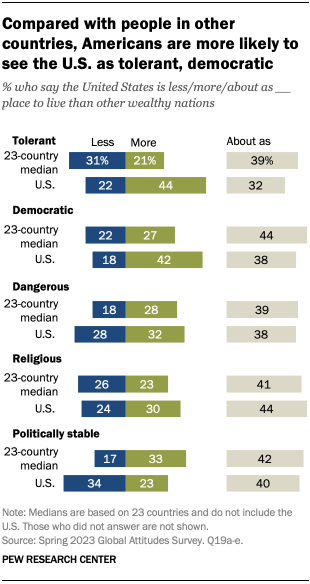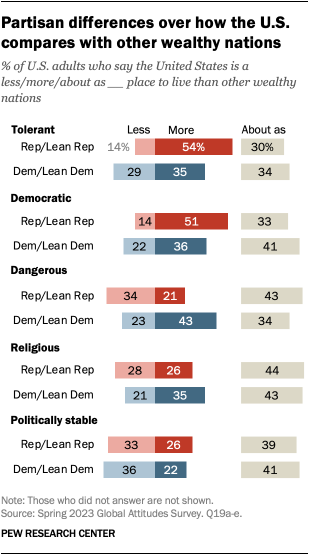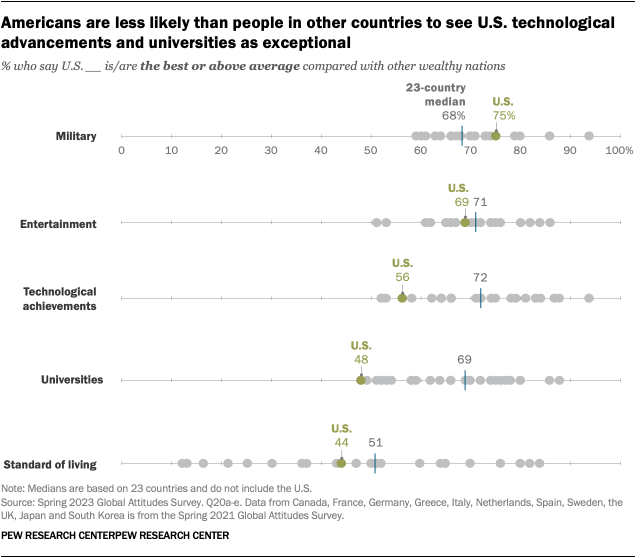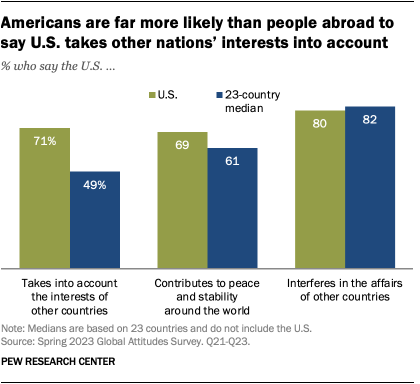People around the world see both strengths and flaws in the United States, but they generally view the U.S. positively, according to a new Pew Research Center survey of 24 countries.
This analysis focuses on views of the United States among Americans, compared with public opinion in 23 other countries in North America, Europe, the Middle East, the Asia-Pacific, Africa and Latin America.
For non-U.S. data, this analysis draws on nationally representative surveys of 27,285 adults conducted from Feb. 20 to May 22, 2023. All surveys were conducted over the phone with adults in Canada, France, Germany, Greece, Italy, Japan, the Netherlands, South Korea, Spain, Sweden and the United Kingdom. Surveys were conducted face-to-face in Hungary, Poland, India, Indonesia, Israel, Kenya, Nigeria, South Africa, Argentina, Brazil and Mexico. In Australia, we used a mixed-mode probability-based online panel. For more on how people in other countries view the U.S., refer to “International Views of Biden and U.S. Largely Positive.”
In the United States, we surveyed 3,576 U.S. adults from March 20-26, 2023. Everyone who took part in this survey is a member of the Center’s American Trends Panel (ATP), an online survey panel that is recruited through national, random sampling of residential addresses. This way nearly all U.S. adults have a chance of selection. The survey is weighted to be representative of the U.S. adult population by gender, race, ethnicity, partisan affiliation, education and other categories. Read more about the ATP’s methodology.
Here are the questions used for the analysis, along with responses, and the survey methodology.
The survey also asked Americans how they feel about their own country. Compared with people internationally, Americans are more likely to view the U.S. as tolerant and democratic and to praise America’s role in world affairs. But they are less likely to view the U.S. as politically stable and to rate its universities or technological achievements highly.
Views of how the U.S. compares with other wealthy nations

The survey asked people in 23 countries, and in the U.S., how America compares with other wealthy nations on a variety of measures, including tolerance, democracy, safety, religiosity and political stability.
People around the world generally see the U.S. as similar to other wealthy nations on many of these measures. However, a median of 31% in other countries say the U.S. is less tolerant than other wealthy countries, while 21% say it is more tolerant. Among Americans, the balance of opinion is reversed: 44% say the U.S. is more tolerant than other nations while 22% say it is less tolerant.
People in other countries are relatively divided over whether the U.S. is more democratic or less democratic than other wealthy nations. But Americans themselves are far more likely to see the U.S. as more democratic than other countries, as opposed to less (42% vs. 18%).
There are also differences when it comes to the relative political stability of the U.S. A median of 33% of people in the 23 surveyed countries believe the U.S. is more politically stable than other countries, while 17% say it is less stable. Americans themselves take a more pessimistic view: 34% say the U.S. is less politically stable than other wealthy countries, while 23% say it is more stable.
How Americans’ views of the U.S. vary by political party

Republicans and Democrats in the U.S. have different perceptions of how the country compares with other wealthy nations on nearly every measure in the survey.
Roughly half or more of Republicans and GOP leaners say the U.S. is more tolerant (54%) and democratic (51%) than other wealthy nations. Democrats and Democratic-leaning independents are much less likely to hold these views and more likely to see the U.S. as similar to other countries.
When it comes to safety, Democrats are about twice as likely as Republicans to say the U.S. is a more dangerous place to live than other nations (43% vs. 21%).
Both Republicans and Democrats most commonly say the U.S. is as religious as other nations, but a larger share of Democrats than Republicans say the U.S. is more religious than other nations.
Views of political stability are roughly similar among both parties.
Views of American institutions and products
The survey also asked people to compare the U.S. with other wealthy nations when it comes to its military, entertainment (such as music, movies and television), technological achievements, universities and standard of living. Overall, people abroad and in the U.S. have very positive opinions of these aspects of American culture and society. Americans, however, are more negative than people in many other countries on several items.
In fact, the military is the only item where Americans tend to rate the U.S. higher than people in other countries do. Three-quarters of Americans say the U.S. military is the best or above average, compared with a median of 68% across the 23 other countries surveyed. People from only five other countries have a more positive assessment than Americans do of the U.S. military: Israel (where 94% say the U.S. military is the best or above average), Nigeria (86%), Poland (86%), Sweden (79%) and Kenya (78%).

When it comes to American music, movies and television, Americans agree with others around the world that these products are the best or above average compared with those of other wealthy nations. About seven-in-ten Americans (69%) and a median of 71% of people in other countries see U.S. entertainment this way.
Americans have more critical views than people in other countries of the United States’ standard of living, technological achievements and universities. While 44% of Americans say that the U.S. standard of living is the best or above average, a median of 51% in other countries say the same. And while 56% of Americans say U.S. technology is superlative, a median of 72% in other countries say this.
When it comes to U.S. universities, Americans are the least likely to say they are above average or the best. Only around half (48%) say this, compared with a median of 69% in other countries.
In the U.S., Republicans are more likely than Democrats to say the standard of living in America is the best or above average among wealthy nations (55% vs. 36%). But Democrats rate American entertainment higher than Republicans (75% vs. 64%), as well as universities (54% vs. 45%).
Views of U.S. role in international affairs
Compared with people in other nations, Americans are especially likely to say the U.S. considers other countries’ interests when making international policy decisions (71% of Americans say this). By comparison, across the 23 other countries surveyed, people are generally split: A median of 49% say Washington considers other nations’ interests and 50% say it does not.

Americans are also more likely than people in other countries to say the U.S. contributes to peace and stability around the world (69% vs. a median of 61%). But Americans are not the most likely to hold this view: 85% of people in Poland and more than 70% in Israel, Japan, Kenya, Nigeria and South Korea think the U.S. helps maintain global stability.
At the same time, a median of 82% in the 23 surveyed nations say the U.S. interferes in the affairs of other countries.
Roughly the same share of Americans agree (80%). But Americans are less likely than others to say the U.S. interferes a great deal: 31% say this, compared with a median of 42% elsewhere.
Unlike most other questions in the survey, Republicans have more negative views than Democrats on this measure: 35% of Republicans say the U.S. interferes a great deal in other countries’ affairs, compared with 28% of Democrats.
Note: Here are the questions used for the analysis, along with responses, and the survey methodology.



